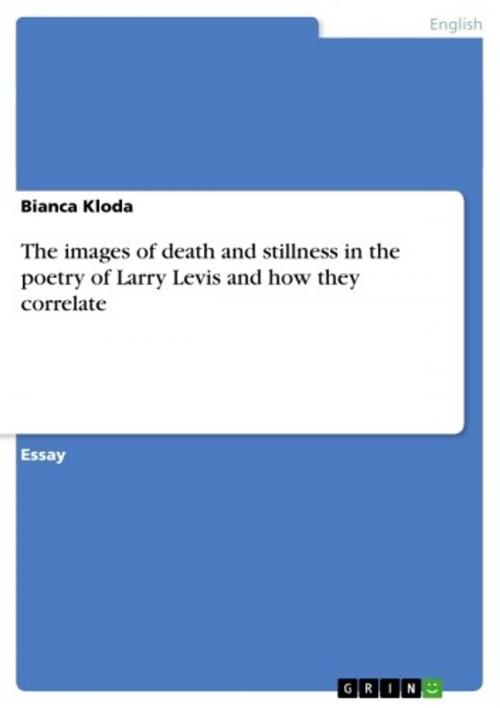The images of death and stillness in the poetry of Larry Levis and how they correlate
Nonfiction, Entertainment, Drama, Anthologies| Author: | Bianca Kloda | ISBN: | 9783638163767 |
| Publisher: | GRIN Publishing | Publication: | January 12, 2003 |
| Imprint: | GRIN Publishing | Language: | English |
| Author: | Bianca Kloda |
| ISBN: | 9783638163767 |
| Publisher: | GRIN Publishing |
| Publication: | January 12, 2003 |
| Imprint: | GRIN Publishing |
| Language: | English |
Essay from the year 2001 in the subject American Studies - Literature, grade: 1.3 (A), University of Southern California (English Department), course: Contemporary British and American Literatures and Cultures, 12 entries in the bibliography, language: English, abstract: Reading especially the later poetry of Larry Levis one cannot deny the quite curious role death and silence/stillness play in it. One of the reasons for that is the very different perception of death from what we consider as normal in our time. [...] Of course there were other times in history when death was seen as the final rest and comfort after a restless and struggling life. That can be seen fairly well for example in the Cantatas of Johann Sebastian Bach, which partly quite joyously pray for death (e.g. the last movement of BWV 82: 'Ich freue mich auf meinen Tod') Both of these representations of death don't occur in that way in Levis' poetry. It is something in-between. I think that Levis knows perfectly well how most people think about death and therefore tries to make death more friendly (if that is possible) from that situation. I'd like to compare this procedure to a special German Lied by Franz Schubert: 'Der Tod und das Mädchen' (Death and the Maiden) with lyrics by Matthias Claudius. I think that the befriending of death in that song works similar to the way Levis does it. The whole song begins with a prelude in d-minor which rhythmically resembles a clock or a heartbeat and is very slow. The we encounter the maiden who really is afraid of Death and tries to run away from him while begging to leave her alone. This passage is musically fast, hasty and dramatic. But, as slow as Death is, as inevitable is he. He appears very calm and also calms down the maiden in a very slow but somehow soothing embrace. [...] The result of all that is that death is befriended, but not to that extend that was common to Bach's time; and this befriending most certainly has nothing to do with suicide. Death simply becomes a necessity of life, because without death there wouldn't be life and the other way around. You need both to define each other. How all this works in detail in connection with silence/stillness in Levis later poetry I'll try to explore in this paper. First I would like to focus on this befriending of death in Levis' poetry. One good example to show this on in my opinion is the poem 'Though His Name Is Infinite, My Father Is Asleep' from the collection 'Winter Stars'. This poem is about the death of the speaker's father, which normally would be pretty depressing but in this case somehow only seems to be logical. The first of possible reasons for that are the words that describe the process of the father's dying.
Essay from the year 2001 in the subject American Studies - Literature, grade: 1.3 (A), University of Southern California (English Department), course: Contemporary British and American Literatures and Cultures, 12 entries in the bibliography, language: English, abstract: Reading especially the later poetry of Larry Levis one cannot deny the quite curious role death and silence/stillness play in it. One of the reasons for that is the very different perception of death from what we consider as normal in our time. [...] Of course there were other times in history when death was seen as the final rest and comfort after a restless and struggling life. That can be seen fairly well for example in the Cantatas of Johann Sebastian Bach, which partly quite joyously pray for death (e.g. the last movement of BWV 82: 'Ich freue mich auf meinen Tod') Both of these representations of death don't occur in that way in Levis' poetry. It is something in-between. I think that Levis knows perfectly well how most people think about death and therefore tries to make death more friendly (if that is possible) from that situation. I'd like to compare this procedure to a special German Lied by Franz Schubert: 'Der Tod und das Mädchen' (Death and the Maiden) with lyrics by Matthias Claudius. I think that the befriending of death in that song works similar to the way Levis does it. The whole song begins with a prelude in d-minor which rhythmically resembles a clock or a heartbeat and is very slow. The we encounter the maiden who really is afraid of Death and tries to run away from him while begging to leave her alone. This passage is musically fast, hasty and dramatic. But, as slow as Death is, as inevitable is he. He appears very calm and also calms down the maiden in a very slow but somehow soothing embrace. [...] The result of all that is that death is befriended, but not to that extend that was common to Bach's time; and this befriending most certainly has nothing to do with suicide. Death simply becomes a necessity of life, because without death there wouldn't be life and the other way around. You need both to define each other. How all this works in detail in connection with silence/stillness in Levis later poetry I'll try to explore in this paper. First I would like to focus on this befriending of death in Levis' poetry. One good example to show this on in my opinion is the poem 'Though His Name Is Infinite, My Father Is Asleep' from the collection 'Winter Stars'. This poem is about the death of the speaker's father, which normally would be pretty depressing but in this case somehow only seems to be logical. The first of possible reasons for that are the words that describe the process of the father's dying.















